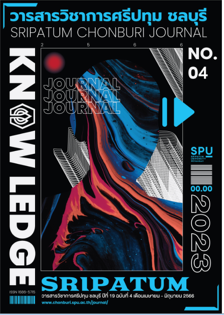THE POTENTIAL FOR SUSTAINABLE COMMUNITY-BASED TOURISM OF KHLONG YONG SUB-DISTRICT, PHUTTHAMONTHON DISTRICT NAKHON PATHOM PROVINCE
Keywords:
The potentials, Tourism Management, Khlong Yong Sub-districtAbstract
The purposes of this research were to study the potentials for sustainable community-based tourism management, a case study of Khlong Yong and to compare the differences in the potential of sustainable community-based tourism management of Klong Yong Sub-district, Nakhon Pathom Province classified by personal factors. This was a quantitative research. The sample groups gained by means of a quota sampling method were 100 people in Khlong Yong Community, consisting of 50 males and 50 females. The researcher collected data by using the questionnaire, having a confidence level of .76. The analysis method employed descriptive statistics including frequency, percentage, and t test, F test (One way ANOVA) with a significance of .05.
It was found that most of them were between 50-60 years of age, followed by those aged between 41-50. Most of them were agriculturalists, followed by merchants. Their education was mostly below undergraduate level. Their average income was 10,001-20,000 baht. They saw that the Khlong Yong Community Nakhon Pathom Province had potentials for sustainable community-based tourism management at the highest level ( =4.58, SD=0.41), with the potential to manage the area community ( =4.64, SD=0.48), followed by the capacity to manage services and knowledge of the community for tourists ( = 4.61, SD=0.49), community tourism resource management potential ( =4.55, SD=0.55) and the management potential of the community's personnel ( =4.53, SD=0.55).
Regarding the hypothesis test, it was found that, for personal factors, people with different genders and ages had different opinions towards the potential for sustainable community-based tourism management with the statistical significance at .05 level. However, those with different education, occupation, and income did not have significantly different opinions towards the potential for sustainable community-based tourism management.
References
กรมการพัฒนาชุมชน. (2561). คู่มือการบริหารโครงการหมู่บ้าน OTOP เพื่อการท่องเที่ยว (OTOP Village) 8 เส้นทาง (ออนไลน์).
เข้าถึงได้จาก: https://www.shorturl.asia/8A1Oe [2564, 20 มีนาคม].
จิราพร เวชวงศ์และสุชาดา สกลกิจรุ่งโรจน์. (2560). ความแตกต่างระหว่างบุคคลที่มีผลต่อความอยู่ดีมีสุขเชิงอัตวิสัยของนักศึกษา
ปริญญาตรี. วารสารวิจัยรำไพพรรณี, 11(2), หน้า 25-33.
นัขนลิน อินทนุพัฒน์. (2563). ศักยภาพชุมชนเพื่อการจัดการการท่องเที่ยวโดยชุมชน กรณีศึกษาชุมชนอ่างเก็บน้ำลำพอก จังหวัดสุรินทร์.
วารสารมนุษยศาสตร์และสังคมศาสตร์ มหาวิทยาลัยมหาสารคาม, 39(2), หน้า 61-73.
บุญชม ศรีสะอาด. (2535). การวิจัยเบื้องต้น (พิมพ์ครั้งที่ 3). กรุงเทพฯ: สุวีริยาสาสน์.
รติตา แก้วจุลกาญจน์. (2554). ชุมชนคลองโยง อำภอพุทธมณฑล จังหวัดนครปฐม ศึกษาประเด็นการจัดการที่ดิน (ออนไลน์).
เข้าถึงได้จาก: http://k-rc.net/imageupload/23902/C_Kongyong.pdf [2564, 20 มีนาคม].
วิเชียร เกตุสิงห์. (2538). สถิติที่ใช้ในการวิจัย. กรุงเทพฯ: กองการวิจัย สํานักงานคณะกรรมการการศึกษาแห่งชาติ.
ศศิชา หมดมลทิล. (2562). ท่องเที่ยวโดยชุมชนวิถีสู่ความยั่งยืน (ออนไลน์). เข้าถึงได้จาก: https://www.gsbresearch.or.th/wp-
content/uploads/2019/10/GR_report_travel_detail.pdf [2564, 25 มีนาคม].
สำนักงานปลัดกระทรวงการท่องเที่ยวและกีฬา. (2563). CULTURE+CREATIVE TOURISM การท่องเที่ยวสร้างสรรค์สถานการณ์
การท่องเที่ยวของประเทศไทยไตรมาส 4/2562. รายงานภาวะเศรษฐกิจการท่องเที่ยว REVIEW, 1(3), หน้า 1-62.
สุจิตตรา ภูมิพนา. (2562). แนวทางในการพัฒนาคุณภาพชีวิตอย่างยั่งยืนโดยใช้หลักการส่งเสริมการท่องเที่ยว กรณีศึกษาชุมชน
บ้านศาลาดิน อำเภอพุทธมณฑล จังหวัดนครปฐม. ใน การประชุมวิชาการนำเสนอผลงานวิจัยระดับชาติด้านมนุษยศาสต์และ
สังคมศาสตร์ มหาวิทยาลัยราชภัฎสวนสุนันทา ครั้งที่ 2 (หน้า 1531-1544). กรุงเทพฯ: มหาวิทยาลัยราชภัฎสวนสุนันทา.
สุวิมล ติรกานันท์. (2548). ระเบียบวิธีการวิจัยทางสังคมศาสตร์: แนวทางสู่การปฏิบัติ (พิมพ์ครั้งที่ 4).กรุงเทพฯ: โรงพิมพ์แห่งจุฬาลงกรณ์
มหาวิทยาลัย.
Cronbach, L. J. (1951). Coefficient alpha and the internal structure of tests. Psychometrika, 16, pp. 297-334.
Strydom, A. J., Mangope, D. & Henama, U. S. (2018). Lessons learned from Successful Community-Based Tourism
Case Studies from the Global South. African Journal of Hospitality, Tourism and Leisure, 7(5), pp. 1-13.
Downloads
Published
Issue
Section
License
Copyright (c) 2023 วารสารวิชาการศรีปทุม ชลบุรี Sripatum Chonburi Journal

This work is licensed under a Creative Commons Attribution-NonCommercial-NoDerivatives 4.0 International License.
บทความทุกบทความเป็นลิขสิทธิ์ของวารสารวิชาการศรีปทุม ชลบุรี



